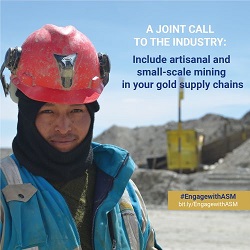
Urgent need to source from ASM mines
In this joint statement, we emphasize that the best opportunity for the gold and jewellery industry to foster positive social, economic and environmental impact is by supporting ASM miners. Choosing for a sourcing strategy that only includes recycled materials means disengaging from the urgent needs of millions of people working in ASM. As the jewellery sector is responsible for a significant portion of the global gold demand, these companies have an important role to play in improving the current situation in the ASM gold sector.
It is estimated that 70-80% of ASM miners worldwide work informally (which is not the same as illegal work). Artisanal and small-scale mining is furthermore regularly associated with unsafe working conditions, gender inequality, child labour, organized criminal activities and negative environmental impact. Although these problems do exist in ASM, the perception that not engaging with the sector will resolve these problems is inaccurate.
Indeed, the sector is in dire need of change. Not investing in or sourcing from ASM is a bad choice, however, because it makes it impossible to improve the current situation. Not engaging with ASM is not a neutral position: it is looking away from the real problems and allowing the status quo to remain in place.
Meanwhile, the ASM sector can also have many positive impacts: rural employment opportunities, income for women who work as miners or in the surrounding mining communities, as well as mining being an economic activity that supports millions of families.

ASM miner at work in one of the mines engaging with The Golden Line, a joint programme of Solidaridad, Simavi and Healthy Entrepreneurs, active in Tanzania and Ghana
Creating positive impact through engagement
Buying responsibly sourced gold from ASM is essential for supporting the livelihoods of millions of people. Moreover, working with and supporting ASM miners who are committed to reducing or eliminating mercury use in gold processing, joining the formal sector, and conforming to other responsible mining practices is a great opportunity for the gold and jewellery industry to create a positive impact.
On the other hand, looking away from the ASM sector will not make it disappear, and can lead to an unintended or de facto ban on ASM. The high price of gold on the international market makes mining an attractive economic activity. Moreover, it’s not only the demand from the jewellery sector that affects the price; the economic uncertainty of the global COVID-19 pandemic has led to gold prices breaking records at the moment due to increased attractiveness of gold as an investment. Meanwhile, improving the practices and the impact in the ASM sector will become impossible should companies continue to choose not to engage with it.

A mine worker wearing protective gear at the Macdesa mine site in Peru. Photo credits: David M – M Photography
Staying critical about the origin of gold
Whilst using recycled metals such as gold can have significant advantages for the environment, there are also drawbacks to sourcing only recycled gold. ASM mining will not cease to exist even if demand for recycled gold increases. In addition, there is simply not enough recycled gold available to meet the high demand for gold.
In fact, using recycled gold is not a foolproof way of ensuring that the gold is responsible and fair. There are a number of challenges when it comes to recycled gold:
- Recycling is also not without environmental and human rights risks. For example, in cases where e-waste is not being disassembled properly, by children and/or under unsafe or unhealthy conditions. A recent publication of the Dutch Gold Sector International RBC Agreement outlines the risks of gold recycling from electronic waste.
- Newly mined gold can also be presented as recycled gold, for instance, for money laundering purposes.
- Recycled gold was previously also mined gold, but it is virtually impossible to determine under which circumstances it was mined. Today’s mined gold can be tomorrow’s recycled gold.
This is why it is essential to have solid due diligence systems in place; to identify, prevent, and mitigate the human rights violations and environmental risks, both for newly mined gold as well as for recycled gold. Solid due diligence processes can help companies that purchase recycled gold verify that it was sourced and produced in a responsible way.
In this joint statement, we advocate for a combined approach of both recycled and responsibly mined ASM gold while ensuring that the needed investments are made in mining communities to foster the well-being and livelihoods of millions of people who depend on artisanal and small-scale mining. By choosing responsible ASM gold, market actors can contribute to creating jobs and developing local economies and communities.

Joint call on the gold industry
We urge the gold and jewellery industry to engage with ASM gold miners and communities, and to actively include ASM gold in their supply chains.
This statement is signed by a variety of civil society as well as small-scale mining organizations. For more information and to view the full list, please refer to the joint statement.
Find out more about Solidaridad’s work in gold.

